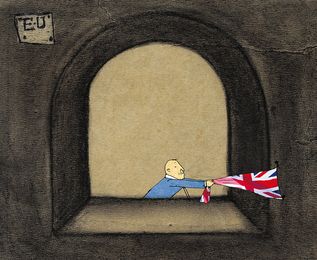For centuries, Britain determined the fate of other nations. Now it cannot seem to decide its own. Worse, others are defining its future.
In the June 2016 referendum, British people voted to leave the European Union (EU). Six months remain for the divorce to take effect, but Britain is nowhere close to a deal with the EU on future relations.
The EU opposes Britain’s “cherry picking”— such as wanting free movement of goods, but not people. The price of belonging to the single market is compliance with EU laws. “In plain English, this means Britain must continue to accept uncontrolled migration from the EU,” protests British Prime Minister Theresa May.
At EU’s Salzburg summit, May presented her Brexit proposal for “frictionless trade”, drafted at a cabinet meeting in Chequers—her medieval, official country residence. “This is the only way forward,” she asserted firmly. At summits, leaders play to the gallery. May’s resolute posture was intended to signal that Britain remains tough and unwavering. It backfired spectacularly. Instead of a breakthrough, the Chequers proposal appeared dead on arrival.
“Unacceptable,” declared French President Emmanuel Macron, who is infuriated by the false claims of Eurosceptic populists rampaging across Europe. EU leaders also need to demonstrate that post-Brexit Britain will be worse off, if only to discourage potential exits by other members. “Brexit shows it is not easy to leave the EU, it is not without costs, it is not without consequences,” thundered Macron. President of the European Council, Donald Tusk, explained the Chequers plan “risks undermining the single market. It will not work”. Britain’s age-old, perfidious divide-and-rule intrigues also did not work.
Shaken by the EU’s united and blunt rejection, May admitted, “We are at an impasse.” Apropos her post-summit press conference, The Independent’s political writer Tom Peck mocked, “Theresa May’s Salzburg humiliation confirms that a full blown political crisis is coming. When the prime minister is sweating profusely, tripping over her words and chewing on her own gums… it is not unfair to come to that conclusion.”
The crisis will unfurl at the Conservative Party’s forthcoming annual conference, where an embattled May faces hostile party members. Critics and political foes sharpen their daggers. Rebuffed by her members of Parliament and rejected by the EU, her Chequers proposal lies in tatters. “I think Chequers now has no supporters at all,” said Jacob Rees-Mogg, Conservative MP. “I doubt even the Downing Street cat is any longer backing it.”
There are calls for a second Brexit referendum. Campaigners believe more people will vote to remain in the EU now that they are aware of the uncertainty and complexity of Brexit. May rejected another referendum saying, “The people have spoken.” But analysts do not rule out a referendum or a snap election.
Britain could crash out of the EU without a deal. “No deal is better than a bad deal,” May said. But, Mike Carney, Bank of England’s governor, warned, “No deal can be as bad as the 2008 financial crisis,” triggering unemployment, recession, devaluation and house price crashes.
Efforts continue to cobble a deal in the coming months, not least, because for EU countries Britain is an important trading and security partner. It suits the UK and the EU to fuel the perception that Brexit negotiations are gruelling. Then, if a deal is struck, it is seen as hard fought and hard won.
Divorce is invariably messy. But, be it the destiny of humans or nations, we know there is always life after the turmoil. What we do not know is if Britain’s mess will get messier or if it will somehow work itself out.
Pratap is an author and journalist.


